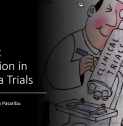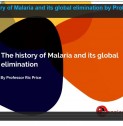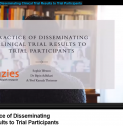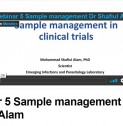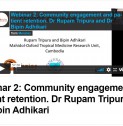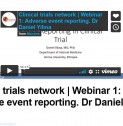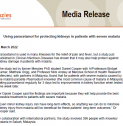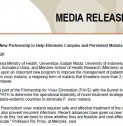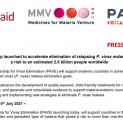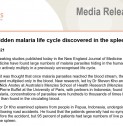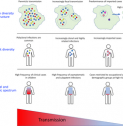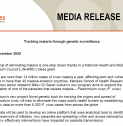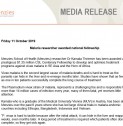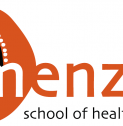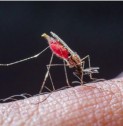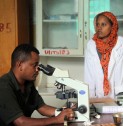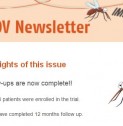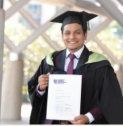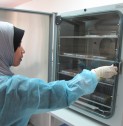Malaria is a major cause of death in the Asia-Pacific, infecting around 250 million people each year.
The Menzies malaria research program spans a broad range of research activities aimed at both prevention and treatment, from epidemiology, diagnosis, pathophysiology, immunology, molecular parasitology, clinical trials, and evaluation of the impact and cost-effectiveness of public health interventions.
We work on all five species of the Plasmodium parasite that cause human malaria, with a particular focus on the three that cause most disease and death in the Asia-Pacific region: P. falciparum, P. vivax and P. knowlesi.
Our research focus:
- To better understand Plasmodium parasites, in particular how they become resistant to drugs, how they cause severe disease and death and how our immune system protects against them. With this knowledge, we can identify better ways to prevent and treat malaria in different environments, facilitating policy change and monitoring the impact of such change on the health of communities.
Our research impact:
- Showed that artemisinin combination therapies (ACT) have high efficacy against all species of malaria in Indonesia and Malaysia. A unified strategy of ACT for all uncomplicated malaria in Papua has led to a significant reduction in falciparum malaria, halving the risk of perinatal mortality. Clinical studies are on going to investigate better ways of using ACT in pregnancy and early life.
- Pioneered a novel laboratory test to assess new drugs against P. falciparum and P. vivax and are working with other drug discovery teams to prioritise the development of key antimalarial agents for the future.
- Observed that levels of a key protective molecule, nitric oxide, are reduced in severe falciparum malaria and that function of the very small blood vessels and the endothelial cells which line them are markedly impaired in severe falciparum malaria. This finding has helped to pioneer new adjunctive therapies to increase nitric oxide and therefore blood supply to vital organs in severe cases and these are now being trialled with partners in Asia.
- Showed P. vivax to be a major cause of severe and fatal malaria in Papua, Indonesia, primarily due to its ability to cause recurrent infections and severe anaemia. Menzies is now leading multicentred clinical trials in seven countries across the Asia-Pacific region to optimise the safe and effective use of primaquine regimens to prevent P. vivax relapse.
- Discovered a new hidden malaria lifecycle of P. vivax and P. falciparum in the human spleen, which contributes to chronic anaemia and chronic, often undetectable infections. This has significant implications for malaria elimination strategies.
- Revealed that P. knowlesi malaria incidence has increased in Sabah as the other species have been brought under control, threatening malaria elimination in areas where P. knowlesi occurs. This result was achieved through the analysis of 20 years of malaria notification data and ongoing prospective studies in collaboration with the Malaysian Ministry of Health.
- Determined that P. knowlesi malaria is three times more likely to cause severe disease than P. falciparum, but that deaths from knowlesi malaria can be avoided by early hospital referral and artesunate.
Key staff:
- Prof Nick Anstey
- Prof Ric Price
- Dr Nick Douglas
- Assoc Prof Sarah Auburn
- Dr Gabriela Minigo
- Kim Piera
- Dr Steven Kho
- Assoc Prof Kamala Thriemer
- Dr Benedikt Ley
- Assoc Prof Matthew Grigg
- Dr Rob Commons
- Dr Angela Devine
- Dr Holger Unger
- Dr Mariana Barnes
- Angela Rumaseb
Honorary Fellows:
- Dr Jutta Marfurt
- Assoc Prof Bridget Barber
Students:
- Daniel Pfieffer
- Varunika Ruwanpura
- Angelica Tan
- Dr Liony Fransisca
- Sarah Cassidy-Seyoum
- Muthoni Mwaura
- Hidayat Trimarsanto
- Arkasha Sadhewa
- Elvin Lufele
- Eri Setiawan
Collaborators:
Australian:
- Australian Army Malaria Institute
- Griffith University
- Queensland Institute of Medical Research
- Burnet Institute
- University of Melbourne
- James Cook University
- University of Sydney
- University of Western Australia
- Walter and Eliza Hall Institute
International
- Asia-Pacific Malaria Elimination Network
- District Health Authority, Papua, Indonesia
- Eijkman Institute for Molecular Biology, Indonesia
- Papuan Community Health and Development Foundation, Timika, Indonesia
- University Gadjah Mada, Indonesia
- University of North Sumatra, Indonesia
- Queen Elizabeth Hospital and Ministry of Health, Malaysia
- University of Otago, New Zealand
- Herbert Kairuki Memorial University, Tanzania
- Arba Minch University, Ethiopia
- Mahidol-Oxford Research Unit, Bangkok, Thailand
- Centre of Tropical Medicine, Oxford University, United Kingdom
- London School of Hygiene and Tropical Medicine, United Kingdom
- Duke University, United States
Clinical Trials
- Advancing the radical cure of Plasmodium vivax malaria through optimal antimalarial regimens
- EFFORT clinical trial: Effectiveness of tafenoquine and primaquine
- PRIMA clinical trial: Universal Radical Cure of P. vivax malaria
- SIRIN Clinical Trial: Radical cure of P. vivax malaria in Nepal
- IMPROV Study: Shorter treatment regimen for radical cure of P.Vivax malaria
- PACKNOW: Paracetamol to ameliorate acute kidney injury in knowlesi malaria
- ZOOMAL - Evaluating zoonotic malaria transmission and agricultural land use in Indonesia
- SAPOT Clinical Trial: Treatment in pregnancy to prevent malaria
- TADORE study: A revised tafenoquine dose to improve radical cure for vivax malaria
Epidemiology
- IMPACT Study: The impact of symptomatic P.vivax infection on G6PD activity
- vivaxGEN: Molecular surveillance of P. vivax
- ACROSS Study: Populations at risk of malaria and drug induced haemolysis
- HOT NORTH
- ZOOMAL: Surveillance for zoonotic malaria in Indonesia
- Sabah malaria surveillance study
Pathophysiology
- Pathogenesis of falciparum, vivax and knowlesi malaria
- Timika SPLEEN studies
Stronger Health and Research Systems
- Stronger Health Systems for multidrug-resistant tuberculosis and malaria
- The Vivax Working Group of the Asia Pacific Malaria Elimination Network (APMEN)
- The Tropical Disease Regional Research Regional Collaborative Initiative: Responding to Drug-Resistant Tuberculosis and Malaria in the Asia-Pacific
Health Economics and Modelling
Click here to view more malaria publications in PubMed.
Key publications in 2019
- Kho, S., Andries, B., Poespoprodjo, J.R., Commons, R.J., Shanti, P.A.I., Kenangalem E, Douglas NM, Simpson JA, Sugiarto P, Anstey N.M. & Price, R.N. (2019). High risk of Plasmodium vivax malaria following splenectomy in Papua, Indonesia. Clinical Infectious Diseases, 68(1):51-60. doi: 10.1093/cid/ciy403.
- Commons, R.J., Simpson, J.A., Thriemer, K., Hossain, M.S., Douglas, N.M., Humphreys, G.S., Sibley, C.H., Guerin, P.J. & Price, R.N. (2019). The risk of Plasmodium vivax parasitaemia after P. falciparum infection: a systematic review and meta-analysis. Lancet Infectious Diseases, 19: 91-101. doi: 10.1016/S1473-3099(18)30596-6.
- Yeo, T.W., Weinberg, J.B., Lampah, D.A., Kenangalem, E., Bush, P., Chen, Y., Price,, R.N., Young, S., Zhang, H.Y., Millington, D., Granger, D.L. & Anstey, N.M. (2019). Glycocalyx Breakdown is Associated with Severe Disease and Fatal Outcome in Plasmodium falciparum Malaria. Clinical Infectious Diseases, 69(10): 1712-1720. doi: 10.1093/cid/ciz038.
- Kenangalem, E., Poespoprodjo, J.R., Douglas, N.M., Burdam, F.H., Gdeumana, K., Chalfein, F., Prayoga, Thio, F., Devine, A., Marfurt, J., Waramori, G., Yeung, S., Noviyanti, R., Penttinen, P., Bangs, M.J., Sugiarto, P., Simpson, J.A., Soenarto, Y., Anstey, N.M. &, Price, R.N. (2019). Malaria morbidity and mortality following introduction of a universal policy of artemisinin-based treatment for malaria in Papua, Indonesia: a longitudinal surveillance study. PLoS Medicine 16(5): e1002815. doi: 10.1371/journal.pmed.1002815.
- Taylor, W.R.J., Thriemer, K., von Seidlein, L., Yuentrakul, P., Assawariyathipat, T., Assefa, A., Auburn, S., Chand, K., Chau, N.H., Cheah, P.Y. Dong, L.T., Dhorda, M., Degaga, T.S., Devine, A., Ekawati, L.L., Fahmi, F., Hailu, A., Hasanzai, M.A., Hien, T.T. ... Price, R.N. (2019). Short course primaquine for the radical cure of Plasmodium vivax malaria: a randomised placebo-controlled multicentre trial. The Lancet, 394: 929–38. doi: 10.1016/S0140-6736(19)31285-1.
- Commons, R.J., Simpson, J.A., Thriemer, K., Chu, C.S., Douglas, N.M., Abreha, T., Alemu, S.G., Anez, A., Anstey, N.M., Aseffa, A., Aseffa, A., Awab, G.R., Baird, J.K., Barber, B.E., Borghini-Fuhrer, I., D'Alessandro, U., Dahal, P., Daher, A., de Vries, P.J., ... Price, R.N. (2019). The haematological consequences of Plasmodium vivax malaria after chloroquine treatment with and without primaquine: a WorldWide Antimalarial Resistance Network systematic review and individual patient data meta-analysis. BMC Medicine, 17:151. doi: 10.1186/s12916-019-1386-6.
- Commons, R.J., Simpson, J.A., Thriemer, K., Abreha, T., Adam, I., Anstey, N.M., Assefa, A., Awab, G.R., Baird, J.K., Barber, B.E., Chu, C.S., Dahal, P., Daher, A., Davis, T.M.E., Dondorp, A.M., Grigg, M.J., Humphreys, G.S., Hwang, J., Karunajeewa, H., ... Price, R.N. (2019). The efficacy of dihydroartemisinin-piperaquine and artemether-lumefantrine with and without primaquine on Plasmodium vivax recurrence: a systematic review and individual patient data meta-analysis. PLoS Medicine, 16(10): e1002928. doi: 10.1371/journal.pmed.1002928.
- Rajahram, G.S., Cooper, D.J., William, T., Grigg, M.J., Anstey, N.M. & Barber, B.E. (2019). Deaths from Plasmodium knowlesi malaria: case series and systematic review. Clinical Infectious Diseases, 69(10): 1703–1711. doi: 10.1093/cid/ciz011.
- Cooper, D.J., Rajahram, G.S., William, T., Jelip, J., Mohammad, R., Benedict, J., Alaza, D.A., Malacova, E., Yeo, T.W., Grigg, M.J., Anstey, N.M. & Barber, B.E. (2020). Plasmodium knowlesi malaria in Sabah, Malaysia, 2015-2017: ongoing increase in incidence despite near-elimination of the human-only Plasmodium species. Clinical Infectious Diseases, 70(3): 361–367. doi: 10.1093/cid/ciz237.
- Kho, S., Minigo, G., Andries, B., Leonardo, L., Prayoga, P., Poespoprodjo, J.R., Kenangalem, E., Price, R.N., Woodberry, T., Anstey, N.M. & Yeo, T.W.. (2019). Circulating neutrophil extracellular traps and neutrophil activation are increased in proportion to disease severity in human malaria. The Journal of Infectious Diseases, 219(12): 1994–2004. doi: 10.1093/infdis/jiy661.
- Barber, B.E., Grigg, M.J., Piera, K., Amante, F.H., William, T., Boyle, M.J., Minigo, G., Dondorp, A.M., McCarthy, J.S. & Anstey, N.M. (2019). Antiphosphatidylserine IgM and IgG antibodies are higher in vivax than falciparum malaria, and associated with early anemia in both species. The Journal of Infectious Diseases, 220(9): 1435–1443. doi: 10.1093/infdis/jiz334.
Selected recent publications (2017-2020)
Clinical trials, meta-analyses and systematic reviews
- Abreha, T., Hwang, J., Thriemer, K., Tadesse, Y., Girma, S., Melaku, Z., Assefa, A., Kassa, M., Chatfield, M.D., Landman, K.Z., Chenet, S.M., Lucchi, N.W., Udhayakumar, V., Zhou, Z., Shi, Y.P., Kachur, S.P., Jima, D., Kebede, A., Solomon, H. ... Price, R.N. (2017). Comparison of artemether-lumefantrine and chloroquine with and without primaquine for the treatment of Plasmodium vivax in Ethiopia: a randomized controlled trial. PLoS Medicine, 14(5) e1002299. doi: 10.1371/journal.pmed.1002299.
- Grigg, M.J., William, T., Piera, K.A., Rajahram, G.S., Jelip, J., Aziz, A., Menon, J., Marfurt, J., Price, R.N., Auburn, S., Barber, B.E., Yeo, T.W. & Anstey, N.M. (2017). Plasmodium falciparum artemisinin resistance monitoring in Sabah, Malaysia: in vivo therapeutic efficacy and kelch13 molecular marker surveillance. Malaria Journal, 17(1):463. doi: 10.1186/s12936-018-2593-x.
- Commons, R.J., Simpson, J.A., Thriemer, K., Humphreys, G.S., Abreha, T., Alemu, S.G., Anez, A., Anstey, N.M, Awab, G.R., Baird, J.K., Barber, B.E., Borghini-Fuhrer, I., Chu, C.S., D'Alessandro, U., Dahal, P., Daher, A., de Vries, P.J., Erhart, A, Gomes, M.S.M. ... & Price, R.N. (2018). The effect of chloroquine dose and primaquine on Plasmodium vivax recurrence: a WorldWide Antimalarial Resistance Network systematic review and individual patient pooled meta-analysis. Lancet Infectious Diseases, 18(9): 1025-1034. doi: 10.1016/S1473-3099(18)30348-7.
- Grigg, M.J., William, T., Barber, B.E., Rajahram, G.S., Menon, J., Schimann, E., Wilkes, C.S., Patel, K., Chandna, A., Price, R.N., Yeo, T.W. & Anstey, N.M. (2018). Artemether-lumefantrine versus chloroquine for the treatment of uncomplicated Plasmodium knowlesi malaria: an open-label randomized controlled trial (CAN KNOW). Clinical Infectious Diseases, 66(2): 229-236. doi: 10.1093/cid/cix779.
- Commons, R.J., Simpson, J.A., Thriemer, K., Hossain, M.S., Douglas, N.M., Humphreys, G.S., Sibley, C.H., Guerin, P.J. & Price, R.N. (2019). The risk of Plasmodium vivax parasitaemia after P. falciparum infection: a systematic review and meta-analysis. Lancet Infectious Diseases, 19: 91-101. doi: 10.1016/S1473-3099(18)30596-6.
- Taylor, W.R.J., Thriemer, K., von Seidlein, L., Yuentrakul, P., Assawariyathipat, T., Assefa, A., Auburn, S., Chand, K., Chau, N.H., Cheah, P.Y. Dong, L.T., Dhorda, M., Degaga, T.S., Devine, A., Ekawati, L.L., Fahmi, F., Hailu, A., Hasanzai, M.A., Hien, T.T. ... Price, R.N. (2019). Short course primaquine for the radical cure of Plasmodium vivax malaria: a randomised placebo-controlled multicentre trial. The Lancet, 394: 929–38. doi: 10.1016/S0140-6736(19)31285-1.
- Commons, R.J., Simpson, J.A., Thriemer, K., Abreha, T., Adam, I., Anstey, N.M., Assefa, A., Awab, G.R., Baird, J.K., Barber, B.E., Chu, C.S., Dahal, P., Daher, A., Davis, T.M.E., Dondorp, A.M., Grigg, M.J., Humphreys, G.S., Hwang, J., Karunajeewa, H., ... Price, R.N. (2019). The efficacy of dihydroartemisinin-piperaquine and artemether-lumefantrine with and without primaquine on Plasmodium vivax recurrence: a systematic review and individual patient data meta-analysis. PLoS Medicine, 16(10): e1002928. doi: 10.1371/journal.pmed.1002928.
- Commons, R.J., Simpson, J.A., Thriemer, K., Chu, C.S., Douglas, N.M., Abreha, T., Alemu, S.G., Añez, A., Anstey, N.M., Aseffa, A., Aseffa, A., Awab, G.R., Baird, J.K., Barber, B.E., Borghini-Fuhrer, I., D'Alessandro, U., Dahal, P., Daher, A., de Vries, P.J., Erhart, A., ... Price, R.N. (2019). The haematological consequences of Plasmodium vivax malaria after chloroquine treatment with and without primaquine: a WorldWide Antimalarial Resistance Network systematic review and individual patient data meta-analysis. BMC Medicine, 17:151. doi: 10.1186/s12916-019-1386-6
- Ahmed, R., Poespoprodjo, J.R., Syafruddin, D., Khairallah, C., Pace, C., Lukito, T., Maratina, S.S., Asih, P.B.S., Santana-Morales, M.A., Adams, E.R., Unwin, V.T., Williams, C.T., Chen, T., Smedley, J., Wang, D., Faragher, B., Price, R.N.& ter Kuile, F.O. (2019). Efficacy and safety of Intermittent preventive treatment (IPT), intermittent screening and treatment (IST) and single screening and treatment (SST) with dihydroartemisinin-piperaquine for the control of malaria in pregnancy in Indonesia: An open label cluster-randomized controlled trial. Lancet Infectious Diseases, 19 (9), 973-987. doi: 10.1016/S1473-3099(19)30156-2.
Clinical spectrum and diagnosis
- Grigg, M.J., William, T., Barber, B.E., Rajahram, G.S., Menon, J., Schimann, E., Piera, K., Wilkes, C.S., Patel, K., Chandna, A., Drakeley, C.J., Yeo, T.W. & Anstey, N.M. (2018). Age-related clinical spectrum of Plasmodium knowlesi malaria and predictors of severity. Clinical Infectious Diseases 67(3): 350-359. doi: 10.1093/cid/ciy065.
- Aung, N.M., Nyein, P.P., Htut, T.Y., Htet, Z.W., Kyi, T.T., Anstey, N.M, Kyi, M.M. & Hanson, J. (2018). Antibiotic Therapy in Adults with Malaria: High Rate of Clinically Significant Bacteremia in Hospitalized Adults Diagnosed with Falciparum Malaria. The American Journal of Tropical Medicine and Hygiene, 99(3): 688–696. doi:10.4269/ajtmh.18-0378.
- Kho, S., Andries, B., Poespoprodjo, J.R., Commons, R.J., Shanti, P.A.I., [...], Anstey, N.M, Price, R.N. (2019). High risk of Plasmodium vivax malaria following splenectomy in Papua, Indonesia. Clinical Infectious Diseases, 68(1): 51-60. doi: 10.1093/cid/ciy403.
- Rajahram, G.S., Cooper, D.J., William, T., Grigg, M.J., Anstey, N.M. & Barber, B.E. (2019). Deaths from Plasmodium knowlesi malaria: case series and systematic review. Clinical Infectious Diseases, 69(10):1703–1711. doi:10.1093/cid/ciz011.
- Ley, B., Satyagraha, A.W., Rahmat, H., von Fricken, M.E., Douglas, N.M., Pfeffer, D.A., Espino, F.E., von Seidlein, L., Henriques, G., Oo, N.N., Menard, D., Parikh, S., Bancone, G., Karahalios, A. & Price RN. (2019) Performance of the Accessbio/Carestart rapid diagnostic test for the detection of glucose 6 phosphate dehydrogenase deficiency: a systematic review and meta-analysis. PLoS Medicine, 16(12): e1002992. doi: 10.1371/journal.pmed.1002992
Epidemiology, surveillance and health economics
- Grigg, M.J., Cox, J., William, T., Jelip, J., Fornace, K.M., Brock, P.M., von Seidlein, L., Barber, B.E., Anstey, N.M, Yeo, T.W. & Drakeley, C.J. (2017). Individual factors associated with the risk of acquiring human Plasmodium knowlesi malaria in Malaysia: a case-control study. Lancet Planet Health, 1(3), e97–e104. doi: 10.1016/S2542-5196(17)30031-1.
- Trimarsanto, H., Benavente, E.D., Noviyanti, R., Utami, R.A.S., Getachew, S., Kim, J.Y., Goo, Y.K., Wangchuck, S., Liu, Y., Gao, Q., Dowd, S., Cheng, Q., Clark, T.G., Price, R.N. & Auburn, S. (2017). VivaxGEN: A Platform for Comparative Analysis of Short Tandem Repeat Genotyping Data in Plasmodium vivax Populations. PLoS Neglected Tropical Diseases, 11(3): e0005465. doi: 10.1371/journal.pntd.0005465.
- Devine, A., Parmiter, M., Chu, C.S., Bancone, G., Nosten, F., Price, R.N., Lubell, Y. & Yeung, S. (2017). Using G6PD Tests to Enable the Safe Treatment of Plasmodium vivax Infections with Primaquine on the Thai-Myanmar border: a Cost-Effectiveness Analysis. PLoS Neglected Tropical Diseases, 11(5):e0005602. doi: 10.1371/journal.pntd.0005602.
- Douglas, N.M., Poespoprodjo, J.R., Patriani, D., Malloy, M.J., Kenangalem, E., Sugiarto, P., Simpson, J.A., Soenarto, Y., Anstey, N.M. & Price, R.N. (2017). Unsupervised primaquine for the treatment of Plasmodium vivax malaria relapses in southern Papua: a hospital-based cohort study. PLoS Medicine, 14(8): e1002379. doi: 10.1371/journal.pmed.1002379.
- Auburn, S., Benavente, E.D., Miotto, O., Pearson, R.D., Amato, R., Grigg, M.J., Barber, B.E., William, T., Handayuni, I., Marfurt, J., Trimarsanto, H., Noviyanti, R., Sriprawat, K., Nosten, F., Campino, S., Clark, T.G.,Anstey, N.M, Kwiatkowski, D.P. & Price, R.N. (2018). Genomic analysis of a pre-elimination Malaysian Plasmodium vivax population reveals selective pressures and changing transmission dynamics. Nature Communications, 9(1): 2585. doi: 10.1038/s41467-018-04965-4.
- Kenangalem, E., Poespoprodjo, J.R., Douglas, N.M., Burdam, F.H., Gdeumana, K., Chalfein, F., Prayoga, Thio, F., Devine, A., Marfurt, J., Waramori, G., Yeung, S., Noviyanti, R., Penttinen, P., Bangs, M.J., Sugiarto, P., Simpson, J.A., Soenarto, Y., Anstey, N.M. &, Price, R.N. (2019). Malaria morbidity and mortality following introduction of a universal policy of artemisinin-based treatment for malaria in Papua, Indonesia: a longitudinal surveillance study. PLoS Medicine 16(5): e1002815. doi: 10.1371/journal.pmed.1002815.
- Auburn, S., Getachew, S., Pearson, R.D., Amato, R., Miotto, O., Trimarsanto, H., Zhu, S.J., Rumaseb, A., Marfurt, J., Noviyanti, R., Grigg, M.J., Barber, B., William, T., Goncalves, S.M., Drury, E., Sriprawat, K., Anstey, N.M., Nosten, F., Petros, B., ... & Price, R.N. (2019). Genomic analysis of Plasmodium vivax in southern Ethiopia reveals selective pressures in multiple parasite mechanisms. Journal of Infectious Diseases, 220:1738-49. doi: 10.1093/infdis/jiz016
- Devine, A., Pasaribu, A.P., Teferi, T., Pham, H.T., Awab, G.R., Contantia, F., Nguyen, T.N., Ngo, V.T., Tran, T.H., Hailu, A., Gilchrist, K., Green, J.A., Koh, G., Thriemer, K., Taylor, W.R.J., Day, N.P.J., Price, R.N. & Lubell, Y. (2019). Provider and household costs of Plasmodium vivax malaria episodes: a multicountry comparative analysis of primary trial data. Bulletin of WHO, 97(12):828–836. doi: 10.2471/BLT.18.226688
- Cooper, D.J., Rajahram, G.S., William, T., Jelip, J., Mohammad, R., Benedict, J., Alaza, D.A., Malacova, E., Yeo, T.W., Grigg, M.J., Anstey, N.M & Barber, B.E. (2020). Plasmodium knowlesi malaria in Sabah, Malaysia, 2015-2017: ongoing increase in incidence despite near-elimination of the human-only Plasmodium species. Clinical Infectious Diseases, 70(3): 361–367. doi: 10.1093/cid/ciz237
Pathogenesis and immunology
- Barber, B.E., Grigg, M.J., William, T., Piera, K.A., Boyle, M., Yeo, T.W. & Anstey, N.M. (2017). Effects of Aging on Parasite Biomass, Inflammation, Endothelial Activation, Microvascular Dysfunction and Disease Severity in Plasmodium knowlesi and Plasmodium falciparum Malaria. Journal Infectious Diseases, 215(12): 1908-1917. doi: 10.1093/infdis/jix193.
- Kho, S., Barber, B.E., Johar, E., Andries, B., Poespoprodjo, J.R., Kenangalem, E., Piera, K.A., Ehmann, A., Price, R.N., William, T., Woodberry, T., Foote, S., Minigo, G., Yeo, T.W., Grigg, Anstey, N.M. & McMorran, B. (2018). Platelets kill circulating parasites of all major Plasmodium species in human malaria. Blood, 132(12):1332-1344. doi:10.1182/blood-2018-05-849307.
- Oyong, D.A., Kenangalem, E., Poespoprodjo, J.R., Beeson, J.G., Anstey, N.M. Price, R.N. & Boyle, M.J. (2018). Loss of complement regulatory proteins on uninfected erythrocytes in vivax and falciparum malaria anemia. JCI Insight, 3(22): 124854. doi: 10.1172/jci.insight.124854.
- Barber, B.E., Grigg, M.J., Piera, K.A., William, T., Cooper, D.J., Plewes, K., Dondorp, A.M., Yeo, T.W. & Anstey, N.M. (2018). Intravascular haemolysis in severe Plasmodium knowlesi malaria: association with endothelial activation, microvascular dysfunction, and acute kidney injury. Emerging Microbes Infection, 7(1):106. doi: 10.1038/s41426-018-0105-2.
- Barber, B.E., Russell, B., Grigg, M.J., Zhang, R., William, T., Amir, A., Lau, Y.L., Chatfield, M.D., Dondorp, A.M. & Yeo, T.W. (2018). Reduced red blood cell deformability in Plasmodium knowlesi malaria. Blood Advances, 2(4): 433-443. doi: 10.1182/bloodadvances.2017013730.
- Kho, S., Minigo, G., Andries, B., Leonardo, L., Prayoga, P., Poespoprodjo, J.R., Kenangalem, E., Price, R.N., Woodberry, T., Anstey, N.M. & Yeo, T.W. (2019). Circulating neutrophil extracellular traps and neutrophil activation are increased in proportion to disease severity in human malaria. The Journal of Infectious Diseases, 219(12):1994–2004. doi:10.1093/infdis/jiy661.
- Yeo, T.W., Weinberg, J.B., Lampah, D.A., Kenangalem, E., Bush, P., Chen, Y., Price, R.N., Young, S., Zhang, H.Y., Millington, D., Granger, D.L. & Anstey, N.M. (2019). Glycocalyx Breakdown is Associated with Severe Disease and Fatal Outcome in Plasmodium falciparum Malaria. Clinical Infectious Diseases, 69(10): 1712–1720. doi:10.1093/cid/ciz038.
- Loughland, J.R., Woodberry, T., Boyle, M.J., Tipping, P.E., Piera, K.A., Amante, F.H., Kenangalem, E., Price, R.N., Engwerda, C.R., Anstey, N.M., McCarthy, J.S. & Minigo G. (2019) Plasmodium falciparum activates CD16+ dendritic cells to produce TNF and IL-10 in subpatent malaria. Journal of Infectious Diseases, 219(4): 660-671. doi: 10.1093/infdis/jiy555.
- Barber, B.E., Grigg, M.J., Piera, K., Amante, F.H., William, T., Boyle, M.J., Minigo, G., Dondorp, A.M., McCarthy, J.S. & Anstey, N.M. (2019). Anti-phosphatidylserine IgM and IgG antibodies are higher in vivax than falciparum malaria, and associated with early anemia in both species. Journal of Infectious Diseases, 220(9):1435–1443. doi:10.1093/infdis/jiz334.
-
Webinar 8: Clinical Trials Network
Patient retention in Malaria Trials: Ayodhia Pitaloka Pasaribu. The password required for the Zoom recording is: mU$z0HQj
-
The history of Malaria and its global elimination by Professor Ric Price
The first in a series of public lectures hosted by CDU-Menzies School of Medicine kicked off on 17 March with Menzies Professor of Global Health Professor Ric Price giving a talk on the history of Malaria and its global elimination.
-
Webinar 7: Clinical Trials Network
Practice of disseminating clinical trial results to trial participants: Sophie Weston and Dr Bipin Adhikari
-
Webinar 5: Clinical Trials Network
Sample management: Dr Shafiul Alam
-
Webinar 4: Clinical Trials Network
Algorithm for haemolytic event in current vivax studies: Dr Tamiru Degaga
-
Webinar 3: Clinical Trials Network
Practical challenges of setting up trials in resource poor settings: Dr Michael Christina and Ms Lenny Ekawati
-
Webinar 2: Clinical Trials Network
Community engagement and patient retention: Dr Rupam Tripura and Dr Bipin Adhikari
-
Webinar 1: Clinical Trials Network
Adverse event reporting: Dr Daniel Yilma
-

Webinar | VxWG TechTalk
Implementation of G6PD testing: challenges and opportunities by Dr Ben Ley
-

Webinar | ACREME webinar #11
Cost-effectiveness modelling and malaria by Dr Angela Devine
-

Webinar | APLMA Gamechanger roundtable
#MalariaWeek: Harnessing innovation to accelerate malaria elimination and strengthen health security
-

Webinar | PATH GORCP
User perspectives on a quantitative G6PD test in Bangladesh
-

Webinar | PATH GORCP
A training for health service providers on the SD Biosensor STANDARD G6PD test in Bangladesh
-

Webinar | VxWG Techtalk
Vivax: Optimizing radical cure for vivax malaria: Informing policy and practice
-

Webinar | ACREME Webinar #4
Clinical trials to improve radical cure of P. vivax by Dr Kamala Thriemer
-

Webinar | ACREME Webinar #1
Designing chloroquine dosing regimens for COVID-19 clinical trials by Prof Ric Price and Prof Julie Simpson
-

Largest-ever IPD meta-analysis of malaria patients to inform haemoglobin changes
A new malaria study using a very large analysis of pooled individual patient data from more than 70,000 patients of all ages, has been published in BMC Medicine. Picture credit: Flickr, Cristhian Alama, Red Mundial
-
Medical Express | Using paracetamol for protecting kidneys in patients with severe malaria
Dr. Daniel Cooper said the findings are important because they will help provide the best possible treatment to patients with severe malaria.
-
Using paracetamol for protecting kidneys in patients with severe malaria
Paracetamol is used in many illnesses for the relief of pain and fever, but a study just published in Clinical Infectious Diseases has shown that it may also help protect against kidney damage in patients with malaria.
-

Public lectures share expert insights in health
The series will kick off with a lecture on March 17 with the Professor of Global Health at Menzies School of Health Research (Menzies), Professor Ric Price, who will talk about the history of Malaria and its global elimination.
-

NT News | Territory shares in funding
MENZIES School of Health Research professor Richard Price will spearhead research to eliminate malaria, thanks to a $2.9m grant through the federal government’s National Health and Medical Research Council (NHMRC) investigator grant scheme.
-
New insights into immune responses to malaria
Advanced technologies have been used to solve a long-standing mystery about why some people develop serious illness when they are infected with the malaria parasite, while others carry the infection asymptomatically.
-
New Partnership to Help Eliminate Complex and Persistent Malaria
The Indonesia Ministry of Health, Universitas Gadjah Mada, University of Indonesia, Universitas Sumatera Utara, and Menzies are embarking upon a new program to improve the management of patients with Plasmodium vivax malaria.
-
New Partnership launched to accelerate elimination of relapsing P. vivax malaria
As part of PAVE, Medicines for Malaria Venture (MMV), PATH, Menzies School of Health Research, and Burnet Institute will work with in-country partners to conduct feasibility studies looking at the best way to use different P. vivax relapse treatments and diagnostics at different levels of the healthcare system in endemic countries.
-

A New $25 Million Unitaid Partnership to Help Eliminate Complex and Persistent Malaria
Brazil, Ethiopia, India, Indonesia, Papua New Guinea, Peru and Thailand are set to benefit from a $25-million “Partnership for Vivax Elimination” (PAVE) which aims to help these countries eliminate Plasmodium vivax (P. Vivax) malaria.
-
$74 million investment in Australian-led clinical trials
Includes a clinical trial in PNG led by Dr Holger Unger and a trial by Prof Peter Morris to reduce infection in Aboriginal mothers and babies.
-
.jpg&w=123&h=126)
Parasit malaria bersembunyi di organ limpa
-

Parasit Malaria Bisa Bersembunyi di Limpa Manusia
Studi terbaru mengungkapkan, parasit malaria terbukti lebih banyak yang bersembunyi dan berkembang biak di dalam limpa manusia. Temuan tersebut mendefinisikan ulang siklus hidup malaria.
-

Penelitian Berhasil Ungkap Parasit Malaria Bersembunyi di Limpa Sumber: https://mediaindonesia.com/humaniora/408850/penelitian-berhasil-ungkap-parasit-malaria-bersembunyi-di-limpa
LEMBAGA Biologi Molekuler Eijkman mengatakan hasil penelitian yang dilakukan Eijkman dan rekannya menunjukkan sejumlah besar parasit malaria ternyata bersembunyi di organ limpa.
-
MEDIA RELEASE | First study to estimate the global costs due to vivax malaria
The global cost of vivax malaria infections could be reduced substantially if radical cure is used more effectively, a new paper has found.
-

Malaria is not only a blood disease, it also hides in the spleen, scientists have discovered
Groundbreaking new research has found large numbers of malaria parasites hiding in the spleen. Until now, it was thought that once malaria parasites reached the bloodstream, they circulated and multiplied only in the blood.
-
Hidden malaria life cycle discovered in the spleen
Ground-breaking studies published today in the New England Journal of Medicine and PLOS Medicine have found large numbers of malaria parasites hiding in the human spleen where they actively multiply in a previously unrecognised life cycle.
-
Finding innovative solutions to eliminate vivax malaria by 2030
New research by Menzies’ malaria team is identifying innovative new ways to eliminate Plasmodium vivax (P. vivax) malaria by 2030.
-
Regional research set to get digital boost
Resources Regional Collaborations Programme COVID-19 Digital Grants, recognises A/Prof Kamala Ley-Thriemer, Dr Jo Wapling and Dr Chris Lowbridge.
-
Media release | Tracking malaria through genetic surveillance
The goal of eliminating malaria is one-step closer thanks to a an NHMRC Ideas grant to Menzies senior research fellow Dr Sarah Auburn.
-

Lost in translation: In search of an end to the malaria epidemic
CDU Research Impact story | Menzies researcher Dr Kamala Ley-Thriemer is committed to the cause.
-
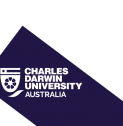
Malaria research leads CDU graduate to USA
Completing his PhD with CDU through the Menzies School of Health Research, Damian Oyong has made a significant contribution to fighting the disease.
-

Radical cure instrumental in beating malaria
Research findings by Charles Darwin University PhD graduate Dr Robert Commons has the potential to deliver health benefits to millions of malaria sufferers around the globe.
-
An open letter from 119 scientists and researchers to The Lancet
Signed by clinicians, medical researchers, statisticians, and ethicists from across the world, follows the publication of a paper on using hydroxychloroquine or chloroquine for the treatment of COVID-19.
-

Five medical research projects recognised in the Northern Territory
Five researchers based at Menzies have received recognition in the form of Investigator Grants from the NHMRC and the MRFF.
-
$400 million funding boost for health and medical research
Including Menzies School of Health Research work towards the elimination of chronic hepatitis B in the Northern Territory.
-
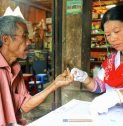
Calls for a universal radical cure to treat malaria
The elimination of malaria from the Asia Pacific within the decade will require the safe and effective radical cure of malaria, a new paper in Trends in Parasitology suggests.
-

Calls for a universal radical cure to treat malaria
The elimination of malaria from the Asia Pacific within the decade will require the safe and effective radical cure of malaria, a new paper in Trends in Parasitology suggests.
-
Menzies investigators and international collaborators from ACROSS and other institutions have published a meta-analysis
Menzies investigators and international collaborators have published a meta-analysis and identified a point of care test for the diagnosis of G6PD deficiency with suitable reliability for routine use. Further feasibility studies are under way to assess its reliability under field conditions.
-
Media Release | Malaria researcher awarded national fellowship
Menzies School of Health (Menzies) researcher Dr Kamala Thriemer has been awarded a prestigious $1.25 million CSL Centenary Fellowship to develop and optimise treatment programs against vivax malaria in SE Asia and the Horn of Africa.
-
Media Release | $2.5 million CSL Centenary Fellowships announced
Two Australian scientists have each been awarded AUD$1.25 million CSL Centenary Fellowships over five years to improve treatments for two of the world’s biggest health challenges: malaria and cancer.
-
New Research Pinpoints Faster Treatment to Cure Vivax Malaria
A new research study has shown that a seven-day treatment with a high dose of an anti-malaria drug can be tolerated by patients
-
New study shows faster way to cure vivax malaria
A large clinical trial in Africa and Asia has shown that a 7 day course of high dose primaquine, a drug used to treat P. vivax malaria, is well tolerated.
-
7th International Conference on Plasmodium vivax Research | Final Report
MESA Correspondents bring you cutting-edge coverage from the 7th International Conference on Plasmodium vivax Research (ICPVR 2019).
-
Coverage from the 7th International Conference on Plasmodium vivax Research
Wrapping up the 7th International Conference on Plasmodium vivax Research, day three focused on the topics of P. vivax drugs and approaches for P. vivax elimination.
-
CDU, Menzies researcher leads battle against malaria
National Tribune Online news | Graduating this week with a PhD, rising star malaria researcher Dr Steven Kho.
-
MediaNewsroomCDU, Menzies researcher leads battle against malaria CDU, Menzies researcher leads battle against malaria
Blood platelets, neutrophils and the spleen have novel roles in people with malaria, according to new research from Charles Darwin University (CDU) and Menzies School of Health Research.
-
50 Top Biomedical And Health Scientists Join Prestigious Academy Of Medical Sciences Fellowship
Prof Ric Price recognised by The Academy of Medical Sciences as one of 50 of the UK’s leading figures elected to their esteemed Fellowship.
-
50 top biomedical and health scientists join prestigious Academy of Medical Sciences Fellowship
Professor Richard Price , Professor of Global Health and Senior Principal Research Fellow, Menzies School of Health Research, and Professor of Tropical Medicine, University of Oxford
-
Asia–Pacific research partnerships set to tackle big challenges
The largest grant, of $257,767, goes to the Menzies School of Health Research for a project with collaborators in Bangladesh, Indonesia and the Netherlands.
-

SMH | Commonwealth regional research grants key to 'science diplomacy'
Among the other projects funded are the Menzies School of Health Research partnering with Bangladesh, Indonesia and Nepal to develop malaria treatments.
-

Funding spotlight on eliminating malaria in Vietnam
-
Health Issues India | Could a malaria treatment be found in human blood?
Could a new defence against malaria be found in human blood? Research suggests that human platelets — a component of the blood — form a first-line defence against the malaria parasite.
-

ScienceNews | A newly approved drug could be a boon for treating malaria
The first new treatment in 60 years for a particularly stubborn kind of malaria is raising hopes that it might help eradicate the disease.
-

PNG-Aust researchers to combine under new grant program
Australian and Papua New Guinean research groups will work in partnership to address malaria, tuberculosis and other health security threats, under a new grants program funded by the Australian government.
-
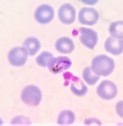
Research reveals defence against malaria parasites
The study, which has just been published in the prestigious journal Blood, was led by Associate Professor Brendan McMorran at ANU and Professor Nick Anstey at Darwin's Menzies School of Health Research
-
Xinhuanet.com|Platelets kill up to 60 pct of malaria parasites: Australian study
The study, published by the Menzies School of Health Research (MSHR) in Australia's Northern Territory (NT), revealed that platelets attack and kill malaria parasites in the bloodstream.
-

Platelets the first line of defence in malaria patients
The humble platelet is usually regarded as just a tiny cell that helps the blood clot. A study just published in the prestigious journal Blood has found that platelets attack and kill malaria parasites in infected humans to reduce the number of parasites circulating in their blood.
-
Improving P. vivax malaria treatment
A study, led by a team at Menzies School of Health Research in Australia, has assembled individual patient data from clinical trials conducted since 2000, investigating the effect of chloroquine dosing, combined with the partner drug primaquine, and the risk of recurrent malaria across different settings.
-

NT News | Malaria breakthrough for NT
NT News page 7 - 21 July 2018 | Report on The Lancet Infectious Diseases P.vivax paper.
-
Xinhua News | "Radical cure" best treatment for common malaria: study
(Xinhua) -- Researchers have discovered that a "radical cure" is the best treatment for a type of malaria affecting 13 million people.
-
New evidence supports radical treatment of widespread form of malaria
A team of malaria experts from a large international research collaboration has today published results supporting the need for a radical cure strategy to tackle one of the most debilitating forms of malaria caused by the Plasmodium vivax parasite.
-

Australian support for eliminating malaria and health research in the Indo-Pacific
Australia is playing a leading role in supporting malaria elimination efforts, particularly in the Indo-Pacific. The Government's Stronger Systems for Health Security program is supporting practical, relevant research into fundamental health security challenges.
-

Tackling Malaysian monkey malaria
Malaysia’s national malaria eradication program has successfully reduced infections associated with Plasmodium falciparum and vivax malaria. to the point where these species may realistically be eradicated by 2020. Plasmodium knowlesi malaria is now...
-

Building genomics expertise in the NT
Menzies is investing and developing expertise in the emerging research area of genome sequencing. In the past year, we took the lead in a number of national and international collaborative programs investigating the genomics of tropical pathogens, and...
-
IMPROV Newsletter Issue #18 | March 2018
We would like to thank all the sites and study staff for all their hard work. This has been a huge undertaking over the past few years which will yield important results to optimise vivax malaria treatment regimens.
-

Malaria victim facing double hand amputation considers legal action against GP
Malaria expert Professor Ric Price, from the Menzies School of Health Research in Darwin, said advising travellers about the prevention of malaria was not straightforward.
-

DFAT: Foreign policy in action - malaria research
Matthew Grigg is a senior research fellow at the Menzies School of Health Research and spent several years researching mosquitoes and malaria while living in a small town called Kudat in Sabah, Malaysia.
-

Award no tall order for Matthew - Darwin Sun
A DARWIN scientist has been named the Young Tall Poppy Scientist of the Year in recognition of his research into a type of monkey malaria transmitted to humans via mosquitoes.
-

Monkey malaria researcher presented with NT Young Tall Poppy award
Dr Matthew Grigg's research into monkey malaria has already changed WHO treatment guidelines and saved lives across Southeast Asia, writes Sarah Condie - Cosmos Magazine
-

PhD: malaria paralyses immune cells
THE quest to develop a better malaria vaccine is a complicated business, but that hasn't deterred Dr Jessica Loughland, of the Menzies School of Health Research, who received a PhD yesterday from Charles Darwin University
-

Katherine Times | Dr Grigg wins science award
Menzies School of Health Research clinical research fellow Dr Matthew Grigg has been named the 2017 NT Young Tall Poppy Scientist of the Year.
-
NT News | Brains Trust Born
Researchers at Darwin's Menzies School of Health Research will play a key role in a new push to fight the scourge of malaria in the Asia-Pacific region.
-
Monkey malaria researcher named NT Young Tall Poppy
Menzies School of Health Research (Menzies) clinical research fellow Dr Matthew Grigg has been named the 2017 NT Young Tall Poppy Scientist of the Year in recognition for ongoing research into Plasmodium knowlesi (P. knowlesi) malaria, a type of monkey malaria transmitted to humans via mosquitos in Southeast Asia.
-
New Australian-led malaria research powerhouse gears up to hunt down malaria across the Asia-Pacific
Australia will take a leadership role in the Asia-Pacific region in a new initiative to help our nearest neighbours rid the scourge of malaria, in a new National Health and Medical Research Council (NHMRC) Centre for Research Excellence in Malaria Elimination.
-

Curious Darwin: Why is there no malaria in Australia's northern capital?
Professor Ric Price is an expert in malaria who works at the Menzies School of Health Research in Darwin. He said the victory over malaria was a result of prompt and effective diagnosis, actions to control mosquito numbers, and close follow-up of people who returned home from overseas who were sick with malaria.
-
Malaria parasite spreads from howler monkeys to humans
Matthew J Grigg, of the Menzies School of Health Research in Darwin, Australia and Georges Snounou, of the Sorbonne University in Paris, France, say it is imperative that studies establish whether this is the simium parasite or whether it might be a reservoir of vivax in Brazilian monkeys, which “would pose a substantial threat to malaria elimination throughout the continent and possibly beyond”
-
Weeding out Malaria
A study led by the Menzies School of Health Research recommends a two-stage treatment for the notoriously difficult-to-cure Plasmodium vivax malaria
-

Study emphasises the need for radical cure of vivax malaria
A study into the treatment of the difficult-to-cure Plasmodium vivax malaria in Ethiopia.
-

Scientists complete the genome sequences of malaria parasites
An international team of scientists has sequenced the genomes of the final two species of malaria parasites. The findings have important implications for malaria eradication worldwide and will help researchers to develop new drugs and a vaccine.
-

$2m grant to combat drug resistant malaria and tuberculosis
A $2m research grant to work towards the prevention, control and elimination of malaria and tuberculosis (TB) in Southeast Asia and the Pacific has been awarded to a consortium led by Menzies School of Health Research, in collaboration with Burnet Institute, the Department of Foreign Affairs and Trade announced today.
-

2016 NHMRC Research Excellence Awards
Two inspiring health researchers from Menzies School of Health Research (Menzies) were awarded prestigious National Health and Medical Research Council (NHMRC) Research Excellence Awards last night in Canberra.
-
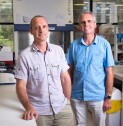
TerritoryQ: War on Malaria, Prof Ric Price and Prof Nicholas Anstey
A medical team based in Darwin has put itself at the centre of the goal to eliminate malaria from the Asia-Pacific
-
Research discovers a hidden burden of vivax malaria parasites causing severe malaria
New research into the malaria parasite Plasmodium vivax has provided insights into why people infected with this malaria species may develop severe disease.
-
Research reveals extent of drug resistant vivax malaria
New research into the extent and nature of drug resistant malaria is hoping to benefit the millions of people worldwide who suffer from the potential deadly disease.
-
Menzies contributes to key antimalarial recommendations from multinational network
A new study by a global collaborative platform for scientists and clinical researchers hopes to address antimalarial drug resistance which continues to hamper malaria control programs.
-

ABC AM: New research into fighting malaria
Scientists say new research into malaria will help provide new ways to combat the deadly disease.
-

Radio Australia: Hopes that genetic mapping will outwit malaria parasite
Scientists say new research into the malaria parasite will provide drugs to combat the ways it's evolving to gain resistance to the current range of anti-malaria medicine.
-

Aljazeera News: Call for global action to tackle Malaria
Countries around the world need to do more to fight the spread of malaria, according to a new report by the World Health Organisation (WHO).
-

Menzies secures critical funding for malaria and tropical health research
The millions of people worldwide who suffer from malaria and other tropical infections each year will benefit from the awarding of a federal fellowship to one of the country's leading clinical researchers in tropical health.
-

Highest award for ground-breaking research into severe malaria


